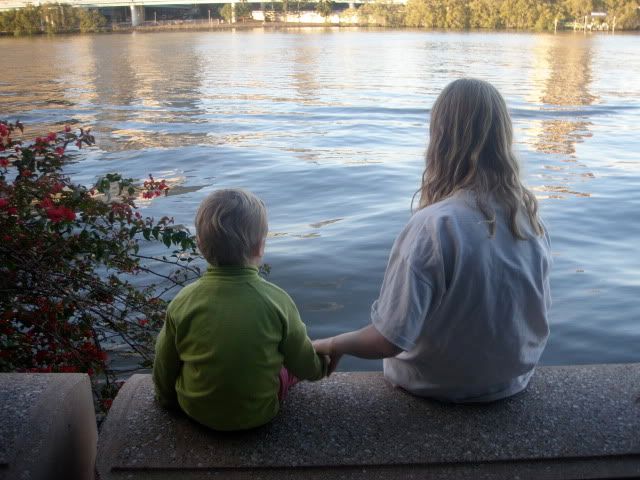As I process and displace my long held attachment to the institutionalised method of education, I think of more and more questions about the lifetime of belief systems that I have accrued surrounding what constitutes "a good education". The schooling system is the unquestioned expert in the field of children's tuition, and yet there are so many complaints about how it operates, from funding, to discipline, to what children should be taught and by whom. There is more and more empahsis on "learning" and the age of children who are supposed to BE learning is shrinking every day. It can't really shrink further than in the womb can it, and there are products available that are designed to help babies in the womb learn!
http://www.babyplus.com/
What a total waste of money right? it's obvious that this is a crock. But parents are so fearful of their child not being able to compete in the education system that they buy this product, and they are sold countless other TOYS under the guise of them being educational. What is wrong with children simply playing, and why don't we view play as a learning opportunity on it's own without having to empahsise the learning properties of plastic toys!?
Which brings me to the point of my gripe. As a beginner unschooling parent, I sometimes questioned whether or not my child would learn the same stuff as all the other children who went to school. I worried that her ability to do fractions, multiplication, spelling and grammar would be somehow dash her hopes of attending university and pursuing the career of her choice. After all, we were unschooling, and we did not spend 6 hours a day doing structured lessons, I did not lesson plan (or I did not intend to continue lesson planing anyway). What if my daughter were at some hideous disadvantage from not learning exactly the same thing that the other millions of children around the state are learning?
It's odd how ingrained this totally unrealistic ideal of the educations system has become in our culture! We pride ourselves as a multi cultural, all encompassing, difference celebrating, culture, the way of life we live is apparently full of freedom and it all begins with our education institution. The very same education system which children hate. The very same one that makes children so competitive they commit suicide in large numbers if they feel they are not going to achieve the marks they want, the system that so many children simply drop out of because it isn't working for them. This is the way of education that states all children are wonderful and different, and that they strive to be inclusive of all cultures, varying ability, and both sexes, and then insists that the children all learn, and be constantly compared to one another, and tested on exactly the same stuff.
Wouldn't recognising children as individuals mean that children had more control over what they learn? Wouldn't it mean that comparing the children to one another, creating either fierce competition or "drop outs" was obsolete? Wouldn't it mean that children were graded on individual achievments not a set level of achievements that is often too low, or too high for many of them?
So, based on the importance of all the children learning all the same stuff, surely when they leave school they will have all the same requirments and opportunities? Ahhh. No. That's not how it works! Why? BECAUSE ALL CHILDREN ARE INDIVIDUALS!!! Some are good at maths, some are good at English, some are bilingual, some are artistic, some are historians, some are scientists, and the last thirteen years have done little to help them discover and explore their true calling in life.
Bring in the un-schoolers!
My daughter hated maths. And maths is one of the most ridiculously over emphasised subjects taught in schools. Maths teachers have tickets on themselves, and yet children across the board hate them and their classes. In reality, schools aren't really doing a great job of teaching the even the most basic maths skills, the most useful maths is the stuff that we use every day in our fast paced society. Fast calculations, times tables, estimation, some fractions and percentages, and time and graph reading are crucial skills. Un-schooled children may not be using calculus or trigonometry but they can read a bus time table. And to them, maths isn't a chore, it's just life. What an interesting approach! Maths is JUST PART OF LIFE! What a shame the maths syllabus seems to have missed the boat on the true importance, and genuine usefulness, of the subject. What a shame they've made children feel inferior to others, and most children hate it!
My daughter is learning about frogs. That's what she's interested in, and it's what she actively researches. But she's also learning to manage a house - from cleaning the toilet to budgeting the weekly shopping, how to get around in the city she lives in, current affairs - and expressing her views on them, growing her own food, cooking it, saving the planet, and lets not forget USEFUL MATHS!
Sheesh. I hope she didn't miss anything good in school today that she can forget next week. I hope the life skills that school children learnt today .... oh, they didn't DO life skills did they ... well I hope they learn lots about REAL LIFE over the xmas holidays, coz they need to be prepared for life when it starts, and they need to be able to compete with kids who have been LIVING LIFE instead of learning useless stuff and forgetting it. They need to begin to learn about their chosen career path, whereas the un-schooled children have most likely spent the last eighteen years immersing themselves in the same stuff.
Well I know I feel a little bit more de-schooled! What about you?



























